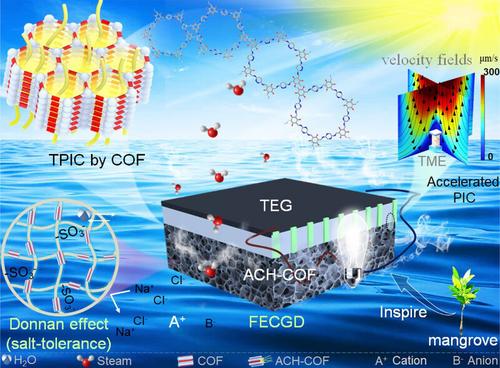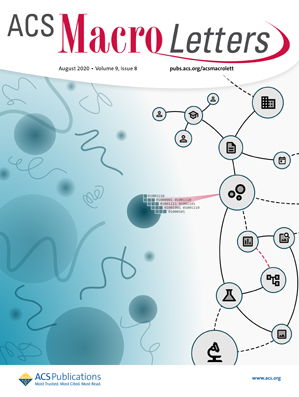Tuning on passive interfacial cooling of covalent organic framework hydrogel for enhancing freshwater and electricity generation
IF 5.1
Q1 POLYMER SCIENCE
引用次数: 0
Abstract
Developing an efficient freshwater and electricity co‐generation device (FECGD) can solve the shortage of freshwater and electricity. However, the poor salt resistance and refrigeration properties of the materials for FECGD put big challenges in the efficient and stable operation of these devices. To address these issues, we propose the covalent organic framework (COF) confined co‐polymerization strategy to prepare COF‐modified acrylamide cationic hydrogels (ACH‐COF), where hydrogen bonding interlocking between negatively charged polymer chains and COF pores can form a salt resistant hydrogel for stabilizing tunable passive interfacial cooling (TPIC). The FECPDs based on the TPIC and salt resistance of ACH‐COF display a maximum output power density of 2.28 W m−2, which is 4.3 times higher than that of a commercial thermoelectric generator under one solar radiation. The production rate of freshwater can reach 2.74 kg m−2 h−1. Our results suggest that the high efficiency and scalability of the FECGD can hold the promise of alleviating freshwater and power shortages.

调节共价有机框架水凝胶的被动界面冷却以提高淡水和发电能力
开发高效的淡水和电力联合发电装置(FECGD)可以解决淡水和电力短缺问题。然而,FECGD 材料的耐盐性和制冷性能较差,给这些装置的高效稳定运行带来了巨大挑战。为了解决这些问题,我们提出了共价有机框架(COF)限制共聚策略来制备 COF 改性丙烯酰胺阳离子水凝胶(ACH-COF),带负电荷的聚合物链与 COF 孔之间的氢键互锁可形成耐盐性水凝胶,从而稳定可调被动界面冷却(TPIC)。基于 ACH-COF 的 TPIC 和耐盐性能的 FECPD 显示出 2.28 W m-2 的最大输出功率密度,在一个太阳辐射条件下是商用热电发电机的 4.3 倍。淡水生产率可达 2.74 kg m-2 h-1。我们的研究结果表明,FECGD 的高效率和可扩展性有望缓解淡水和电力短缺问题。
本文章由计算机程序翻译,如有差异,请以英文原文为准。
求助全文
约1分钟内获得全文
求助全文
来源期刊
CiteScore
10.40
自引率
3.40%
发文量
209
审稿时长
1 months
期刊介绍:
ACS Macro Letters publishes research in all areas of contemporary soft matter science in which macromolecules play a key role, including nanotechnology, self-assembly, supramolecular chemistry, biomaterials, energy generation and storage, and renewable/sustainable materials. Submissions to ACS Macro Letters should justify clearly the rapid disclosure of the key elements of the study. The scope of the journal includes high-impact research of broad interest in all areas of polymer science and engineering, including cross-disciplinary research that interfaces with polymer science.
With the launch of ACS Macro Letters, all Communications that were formerly published in Macromolecules and Biomacromolecules will be published as Letters in ACS Macro Letters.

 求助内容:
求助内容: 应助结果提醒方式:
应助结果提醒方式:


